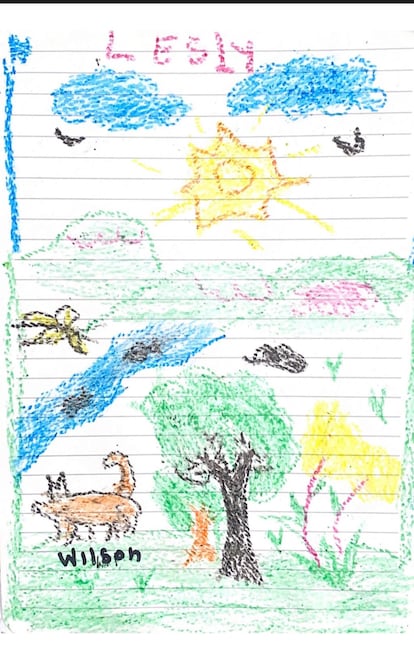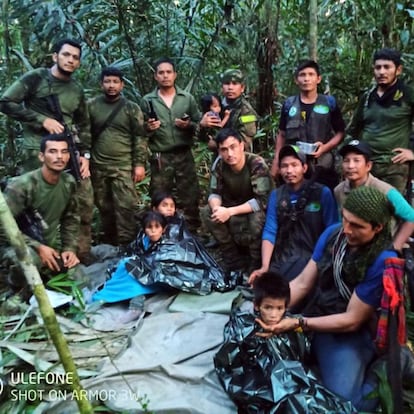Colombia’s missing children: Feel and read the jungle like Lesly and her siblings
The four indigenous minors who survived 40 days in the Colombian jungle have given us all a life lesson and at the same time revealed how incapable urban society is of understanding other world views and ways of living and letting live

As I wandered down one of the aisles of a large food store, filled with displays of well-bagged lettuce, succulent steaks, shiny fruit and finely bottled beverages, the tumultuous but ultimately happy story of Lesly, Soleiny, Tien and Cristin, the four children of the Huitoto ethnic group who disappeared in the Colombian jungle, burst into my memory. The four little ones have given us all a lesson in life and endurance.
The story captivated the entire world and now questions abound as to how they managed to survive amid impenetrable forest and heavy rain, surrounded by all manner of creatures, especially insects. That they were found, after 40 days, by search teams made up of Colombian special forces and indigenous trackers, has been described as a “miracle.” But perhaps what really happens to those of us who live in the often-pernicious comfort of cities is that we do not understand a lot of things. We do not know how to live, or survive.
Alex Tufino, an indigenous member of the Ticuna ethnic group, gave an interview in which he provided some keys to understand what took place, far from the conventional hubbub. “We don’t view it as fear or danger, but as respect. Every centimeter of the jungle has a spirituality that you can’t avoid,” Tufino added that, as children, indigenous people learn skills such as which fruits to eat or, for example, how to follow monkeys that leave food behind them as they move through the forest.
He even suggested that the children were not exactly “lost in the jungle.” They had been separated from their family, but they were in their own ecosystem and the jungle, far from threatening them, saved them. Because they knew how to find food, shelter, a way to carry on. For those of us all too accustomed to living among window displays, chirping electronic devices and department stores full of everything we need and even more that we don’t, this might sound strange, fanciful even.
But the jungle, like other ecosystems, is what it is: they don’t swallow you up, they aren’t intent on killing you, they don’t attack you and neither do they want you to drown in their entrails. They are simply what they are, they flourish and they encourage the torrent of life, even when they themselves have suffered the brutal blow of the unleashed human animal, who gives no quarter and exercises minimal ethics when it comes to exploiting their resources. Indigenous people are not good, per se. They are also predators, but they are much more cautious and intelligent.
They read the jungle, with impressive wisdom. For them, the land is not a piece of dust and rock; it is the territory where their ancestors, deities, and spirits live. It is alive and for that reason, they resist being removed from it when a hydrocarbon or mining company arrives. Among the Awajún of the Peruvian jungle, to cite one example, Nugkui is a feminine spirit that lives under the earth, from where it protects plants and human beings.

For many indigenous groups, rivers and lakes are sacred and those who drown in them do not really die, but go to a world under the water from where they can communicate in dreams. The Huitoto themselves, who also live in Peru, consider the sloth bear and other animals sacred, and when the Covid-19 pandemic broke out, they appealed to them for protection, as well as to the plants that, for them, “are like human beings.”
Hence the grandparents of the rescued children said that the jungle spirits helped them. From the balcony of our comfortable existence, we do not understand that common sense, that way of seeing and feeling the forests, the rivers, the world, and the skies. We suffer from a certain ignorance, as Rufino stated. It is as if urban civilization, despite providing so many benefits and facilities, has severely hindered us when it comes to dealing with nature.
And so it is with our own nature, so incapable of understanding world views that differ from ours, valid and perhaps more useful than those we have predominantly implemented on our planet. Because while these indigenous children are now famous, heroic, in Colombia the killing of indigenous leaders has become infamous (42 were killed in 2022 alone), as both blind greed and armed violence attack them mercilessly.
The children’s father, Manuel Ranoque, had been threatened by FARC dissidents and forced to flee his home, prompting the fateful flight in which his wife was killed, so this trance, this ray of happiness amid everything, is merely a hopeful respite for indigenous communities that face several threats every day. These children lived in the department of Caquetá, a Colombian region that has for years been a battlefield, a land of extortion and cruelty. They are a symbol that life goes on, beyond all fear.
Lesly, the 13-year-old girl who, according to her account, led the group and protected her siblings, including an infant who turned one in the jungle, deserves special mention. Even in this unusual and terrible episode, the women are caregivers; they provide hope, they resist and persist, they do not give up. They suffered during the Colombian armed conflict, and even today they have to endure violence in the jungle and in the cities. But they have weathered the storm.
The Discovery Channel airs a well-known reality program called Naked and Afraid, in which people from various countries are released naked in the wilderness for periods of 21, 40 or even 60 days. They suffer the unspeakable in order to find food, water, and shelter. But as well as having the option of “tapping out” of the challenge whenever they wish and being returned to their normal lives, if they get ill or there is an accident there are personnel nearby who tend to them in emergencies.
In other words: in urban society, in order to live through such an experience, one must imagine it, organize it, foresee it, and have assurances in place. In the indigenous world the premise of Naked and Afraid is usually the norm, and in countless places there is literally no salvation for illnesses that are easily treatable in a city. The indigenous people, in short, are almost always surviving, often with no doctors nearby, and stripped of protection amid the elements of existence.
But at the same time, they are happy to live among the forests that they love and respect; they do not compete to see who is the best; and every day they can see and feel the indecipherable light of the sky, the unfathomable flow of the waters, or the poignant song of hundreds of animals. These children have opened our eyes to this again, through their innocence. Although perhaps there will be no lack of those who want to turn them into “stars,” of the kind that shine not in the Amazon but on pompous red carpets.
Sign up for our weekly newsletter to get more English-language news coverage from EL PAÍS USA Edition
Tu suscripción se está usando en otro dispositivo
¿Quieres añadir otro usuario a tu suscripción?
Si continúas leyendo en este dispositivo, no se podrá leer en el otro.
FlechaTu suscripción se está usando en otro dispositivo y solo puedes acceder a EL PAÍS desde un dispositivo a la vez.
Si quieres compartir tu cuenta, cambia tu suscripción a la modalidad Premium, así podrás añadir otro usuario. Cada uno accederá con su propia cuenta de email, lo que os permitirá personalizar vuestra experiencia en EL PAÍS.
¿Tienes una suscripción de empresa? Accede aquí para contratar más cuentas.
En el caso de no saber quién está usando tu cuenta, te recomendamos cambiar tu contraseña aquí.
Si decides continuar compartiendo tu cuenta, este mensaje se mostrará en tu dispositivo y en el de la otra persona que está usando tu cuenta de forma indefinida, afectando a tu experiencia de lectura. Puedes consultar aquí los términos y condiciones de la suscripción digital.








































